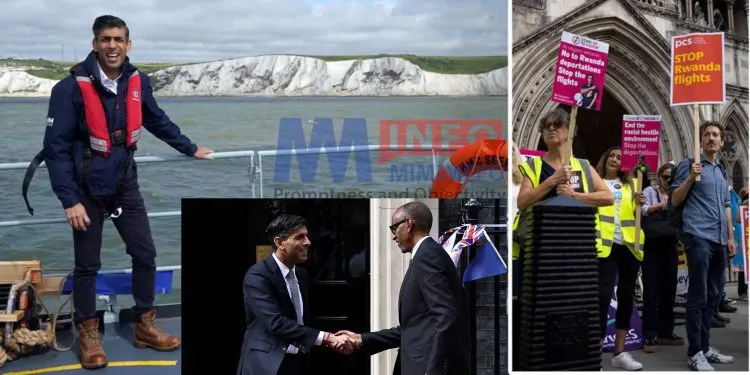British Prime Minister Rishi Sunak‘s legislation aimed at sending asylum seekers to Rwanda is set to become law following a dramatic showdown in the UK Parliament that concluded late into last night. Despite facing intense criticism, the bill secured passage on Monday after the House of Lords withdrew their opposition. Mr. Sunak expressed determination in a statement, asserting that “nothing will stand in our way” of getting flights off the ground.
Nevertheless, the successful execution of the plan may face obstacles due to legal issues. The Prime Minister’s original timeline for the start of flights taking asylum seekers to Rwanda, which was expected to be within 10 to 12 weeks, has now been revised and will not meet the spring target. However, he praised the bill’s passage as a significant change in global migration dynamics, highlighting its ability to discourage dangerous crossings and disrupt criminal networks that exploit vulnerable migrants. In his words, “The passing of this legislation will allow us to do that and make it very clear that if you come here illegally, you will not be able to stay.”
Yvette Cooper, the Shadow Home Secretary, criticised the Rwanda plan as an expensive and ineffective manoeuvre. Charities also expressed their concerns, labelling it a breach of international law. In the midst of this ongoing debate, a live TV report documented a group of migrants setting off on a small boat from Calais towards the UK, highlighting the ongoing challenges that persist.
Minister for Illegal Migration Michael Tomlinson, however, celebrated the bill’s passage as a “landmark moment,” predicting a deterrent effect once flights commence. Nevertheless, legal representatives of potential deportees remain vigilant, exploring avenues to challenge the flights. As Nicholas Hughes, a solicitor at law firm Duncan Lewis, representing affected individuals, stated, “We’ll do everything we can.”
The bill’s progress through Parliament has been quite eventful, marked by numerous challenges and revisions. However, the Prime Minister sees the eventual passage of this legislation as a significant political triumph, as it aligns with his anti-immigration strategy. With the upcoming elections, there is a significant pressure to showcase effectiveness. As the Prime Minister declared, “Plans are in place. And these flights will go, come what may.”
The legislation focuses on approximately 52,000 asylum seekers, particularly those who come through the English Channel. Financial commitments to Rwanda have garnered attention, as projections suggest that costs could surpass £370 million within a span of five years. It is worth mentioning that the bill includes provisions that allow the government to disregard injunctions from the European Court of Human Rights, which has been a subject of debate among legal experts. As Shadow Home Secretary Yvette Cooper pointed out, “This shameful bill trashes the constitution and international law.”
Opposition parties propose different approaches, highlighting the importance of strengthening border security, taking action against criminal syndicates, and improving deportation procedures. Amendments discussing exemptions for Afghan veterans who have been assisting British military efforts were the subject of debate, and the government made some concessions. As Lord Browne of Ladyton acknowledged, the government’s pledge to reassess claims of Afghan veterans with a “credible link” to Afghan special forces was “an extremely important concession.”
Despite the bill awaiting royal assent, there are ongoing concerns surrounding its legal and humanitarian implications of sending asylum seekers to Rwanda. Human rights groups express deep concern over the erosion of legal safeguards, emphasising the potential dire consequences for refugees. Richard Tice, the leader of Reform UK, criticises the plan, suggesting that more assertive interception measures are needed to address irregular migration.
The passage of the Rwanda bill is a crucial moment in the UK’s immigration policy, with its ultimate impact still uncertain due to ongoing scrutiny and dissent.



